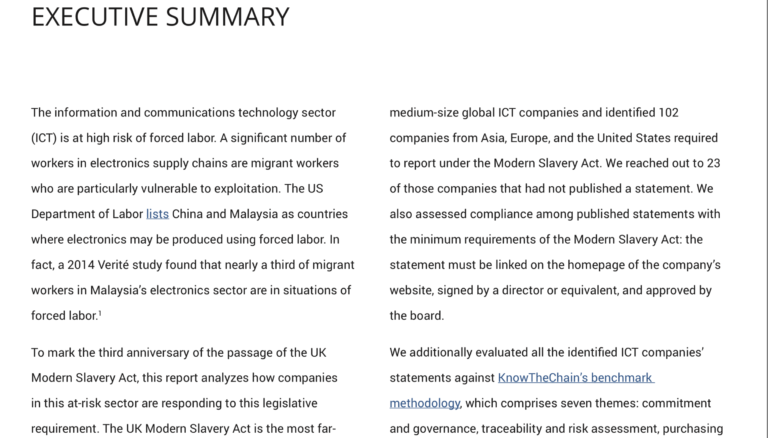The information and communications technology sector(ICT) is at high risk of forced labour. A significant number ofworkers in electronics supply chains are migrant workers who are particularly vulnerable to exploitation. The US Department of Labour lists China and Malaysia as countries where electronics may be produced using forced labour. In fact, a 2014 Verité study found that nearly a third of migrant workers in Malaysia’s electronics sector are in situations of forced labour.
To mark the third anniversary of the passage of the UK Modern Slavery Act, this report analyzes how companies in this at-risk sector are responding to this legislative requirement. The UK Modern Slavery Act is the most far- reaching global legislation on forced labour and humantrafficking currently in effect, as it affects any globalcompany that has a turnover of £36 million or more and carries out business in the UK. Most notably, it is the first piece of legislation that requires not only annual reporting on the steps taken to address modern slavery in a company’s own operations and supply chains, but also board approval and a director’s signature on the company’s public statement – ensuring that senior management, as well as boards, pay attention to the issue of forced labour.
To understand to what extent the sector is aware of and responding to this legislation, we analyzed large- and medium-size global ICT companies and identified 102companies from Asia, Europe, and the United States required to report under the Modern Slavery Act. We reached out to 23 of those companies that had not published a statement. We also assessed compliance among published statements with the minimum requirements of the Modern Slavery Act: the statement must be linked on the homepage of the company’s website, signed by a director or equivalent, and approved by the board.
We additionally evaluated all the identified ICT companies’statements against KnowTheChain’s benchmark methodology, which comprises seven themes: commitment and governance, traceability and risk assessment, purchasing practices, recruitment, worker voice, monitoring, and remedy. All statements receive a score out of 100. Disappointingly, 85% of the analyzed statements scored below 25. This reporthighlights promising practices, as well as gaps identifiedagainst our methodology, and makes recommendations to companies.

